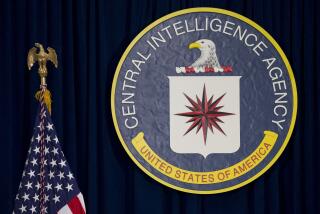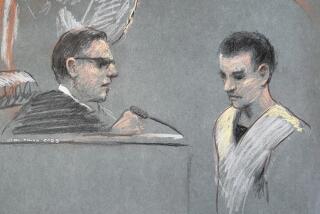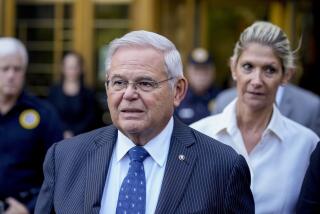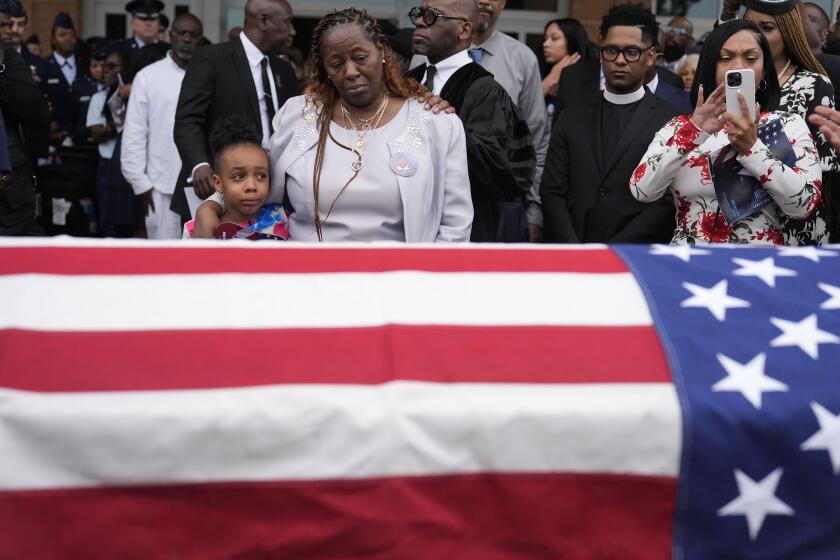First Casualties in Iran-Contra Scandal Housecleaning : 2 Top-Ranking CIA Officials Resigning
The Central Intelligence Agency’s top covert operations official and its inspector general--both casualties of damaging revelations in the Iran-Contra scandal--are resigning, apparently beginning a long-anticipated housecleaning, sources said Wednesday.
Deputy Director for Operations Clair George, a 32-year agency veteran who served undercover in Africa, Lebanon and Europe, announced his resignation at a senior CIA staff meeting Wednesday morning, sources said. A CIA spokesman said that George’s departure will occur at the end of the year.
In addition, CIA Inspector General Carroll Hawver also has disclosed to the agency’s staff that he will resign at year’s end, said knowledegable U.S. officials who declined to be named. CIA spokesman Sharon Foster said the agency could not confirm or deny Hawver’s retirement decision.
More Expected
The resignations are the first of several senior job changes widely expected to occur at the intelligence agency this winter now that inquiries into the Iran-Contra scandal by Congress and by CIA special counsel Russell Bruemmer are at an end.
CIA Director William H. Webster said this week that he will not decide whether to make personnel changes at the intelligence agency for another two to three weeks, until after Bruemmer has reviewed Congress’ report on the scandal and made any revisions to the agency’s own internal inquiry.
Agency spokesman Bill Baker said that George’s departure is voluntary. Informed government officials contended Wednesday that he resigned after he asked senior CIA officials this month for their backing in the face of congressional criticism but failed to get it.
George, 57, had been under especially sharp attack from Senate Intelligence Committee Chairman David L. Boren (D-Okla.), who had made George’s departure from the covert-operations post almost a condition for his continued support of the CIA. The Times reported in July that Webster had agreed to relieve George and two other senior agency officials of their duties.
Both George and Hawver became early targets for criticism as the Iran-Contra affair unfolded last fall and Congress’ report on the scandal was indirectly critical of both men’s conduct during the affair.
George said Wednesday that he resigned “because of about 10 different things” and that he believes Webster should be free to choose a new executive team at the agency.
“I’ve been in government service for about 35 years and I’ve done everything but fly to the moon,” he said. “Now I would like to see my family and I want to retire while I’m still young enough to try something else.”
Will Aid Successor
He said that he will remain at the agency long enough to break in his successor.
In a one-sentence statement, Webster praised George as a man who “served his country and this agency with courage for over 32 years, often overseas and often in most demanding circumstances.”
Among other duties, George became CIA station chief in Athens after anti-U.S. factions killed the previous chief, Richard Welch, in 1975. He also served in Beirut before Lebanon’s civil war disintegrated into a series of terrorist actions.
But his decision in mid-1984 to accept the top covert operations job when it was offered by former CIA Director William J. Casey apparently proved to be a mistake.
George held the post when the White House began the arms-for-hostages swaps with Iran in August, 1985. He later testified that he opposed many controversial aspects of the operation, including Marine Lt. Col. Oliver L. North’s use of retired Air Force Maj. Gen. Richard V. Secord as a private, unsupervised “cutout” for arms shipments to Iran while North was serving as National Security Council aide.
Several of George’s covert-operations subordinates--including the Costa Rica station chief, CIA employees in Honduras and some Washington officials--also have been accused of aiding North’s private arms pipeline to the Contras or failing to disclose knowledge of the arms network to Congress or agency higher-ups.
In testimony before the congressional panels last summer, one of those officials contended that George also was aware of North’s activities. The Costa Rica station chief, known as Tomas Castillo, said that George had advised him to “limit” his sworn testimony on the scandal.
Denied Misdeeds
In his own appearance before the panels, George denied allegations of misdeeds. “I would never in a million years say to an officer: ‘Don’t discuss this, that and that’ ” he said.
George conceded, however, that he had misled congressional intelligence committees in October, 1986, when he told them that the CIA had absolutely no knowledge of or role in the North arms airlift.
“My intent, which may or may not excuse me, was . . . to make the point that the Central Intelligence Agency as an entity was not involved,” he later testified. “I don’t lie, and I did not mean to lie.”
One diplomatic official who served with George agreed Wednesday, saying: “He was always a clean-jean kind of a guy. I always thought he was not too happy working with Casey.”
Candidates for George’s Post
One knowledegable official speculated Wednesday that covert operations veteran Charles Cogan, architect of U.S. support for the Afghan rebels, is a leading candidate to succeed George. Other reported candidates include Ted Price, head of the agency’s personnel office, and Gus Hathaway, chief of counterintelligence.
Hawver supervised the CIA’s first, unproductive investigations into allegations that CIA employees in Central America had given military or logistical support to Nicaraguan rebels in violation of the agency’s own guidelines.
Hawver’s office effectively cleared station chief Castillo of improprieties in the autumn of 1986. But Hawver was forced to reopen the probe last winter after the Costa Rica official told the presidential commission headed by former Sen. John Tower (R-Tex.) that he had helped North route supplies to the rebels at a time when Congress had banned most U.S. military assistance to the Contras.
More to Read
Start your day right
Sign up for Essential California for news, features and recommendations from the L.A. Times and beyond in your inbox six days a week.
You may occasionally receive promotional content from the Los Angeles Times.






